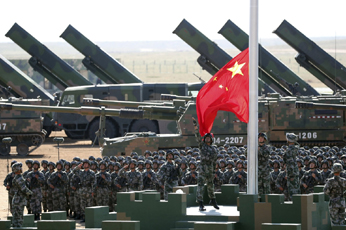China has announced a military budget of 1.11 trillion yuan ($175bn; £126bn) for the coming year.
The figure, an 8% increase on last year, was announced by Prime Minister Li Keqiang as the annual meeting of parliament got under way in Beijing.
Mr Li also set a target of 6.5% growth for the economy.
The National People’s Congress (NPC) is also expected to remove the two-term presidential limit, enabling Xi Jinping to remain in office indefinitely.
The move, which was long expected but has been controversial even in China nonetheless, has helped cement Mr Xi’s status as the most powerful leader since Chairman Mao Zedong.
The NPC is largely a rubberstamp parliament, endorsing decisions already made by the Communist Party.
Its delegates, about 3,000 of them representing all provinces and regions, are technically elected, but in practice, hand-picked by the Party.
The gathering takes place under tight security – known dissidents are routinely removed from the capital before it takes place.
The government has said it will focus on three main goals over the coming year: tackling China’s exposure to financial risk, reining in rampant pollution and continuing to combat poverty.
In his opening report to parliament, Mr Li announced the new military budget, saying the army must be “strong as stone” in the face of “profound changes in the national security environment”.
The rise is seen as a good indication of China’s strategic ambitions, as it continues to modernise its army – the world’s largest – and develop its infrastructure in contested areas like the South China Sea and its Himalayan border regions.
While expected, the spending increase will likely further unnerve China’s regional rivals, including the US, which has just brought its massive aircraft carrier the USS Carl Vinson to Vietnam.
China is now the world’s second largest economy. After years of rapid growth, millions have been lifted out of poverty and there is a ballooning middle class.
There are also some 100 billionaires in China, many of them are members of the the Chinese People’s Political Consultative Conference (CPPCC), the top advisory body which is also meeting this week.
But a reliance on borrowing has led to pressing political concerns about debt risk.
As expected, Mr Li’s report said reining in this risk would be a key policy for the coming year, promising to “see that internal risk controls are tightened in financial institutions” and a “serious crackdown on activities that violate the law like illegal fundraising and financial fraud”.
This could indicate further action like that taken against insurance giant Anbang, which was last month taken over by insurance regulators.-BBC



